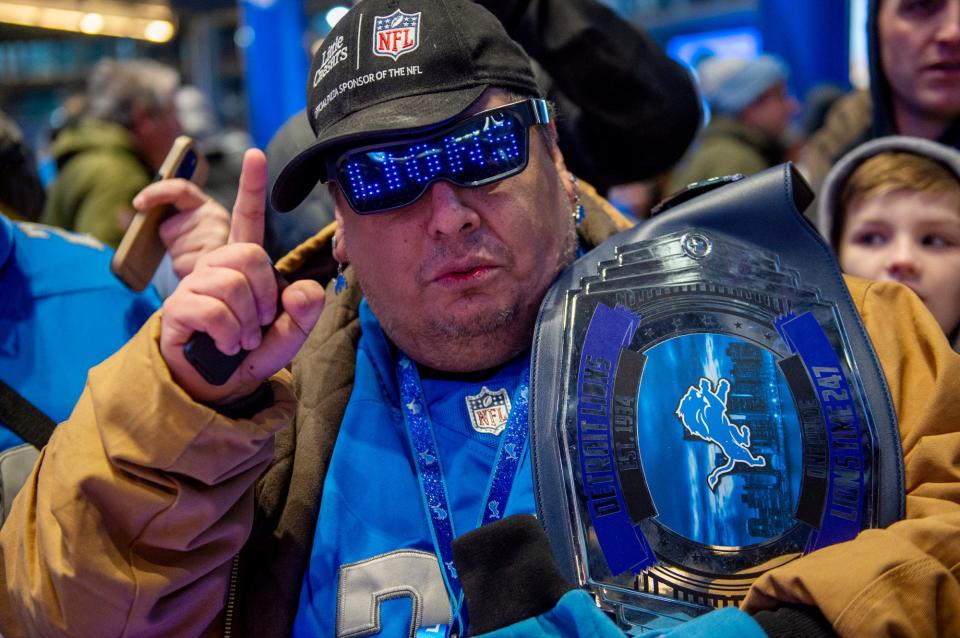Detroit Lions playoff is the latest big event to spark ticket scams
The gotta-be-at-Ford-Field feeling that is driving Detroit Lions fans to pay insane prices for tickets to Sunday's playoff game against Tampa Bay creates a prime-time moment for scammers.
Fake tickets are a real thing, as many Taylor Swift fans sadly learned last summer when some lost $350, $475 and more to online crooks who were pretending that they had real tickets for sale to Swift's Eras Tour.
Oh, the digital tickets can look real. Scammers often create a phony screenshot of a ticket that doesn't exist or has previously been sold, possibly more than once, according to a warning from Michigan Attorney General Dana Nessel about potential scams involving Lions playoff tickets.
It's the kind of scam that can easily trap young consumers who have cash on the sidelines and plenty of confidence in buying what they want online. Many consumers don't realize that screenshots of tickets can be easily faked. Or that look-alike websites are developed by scammers to make you think you're dealing with a legitimate, well-respected ticket seller.
Ticket scam triggers a warning
On Wednesday, the Macomb County Sheriff's Office issued a report that indicated that a man responded to a post on Facebook from a woman selling two tickets to the Lions playoff game on Sunday.
The buyer and seller agreed on a price via Facebook messaging. The money was to be paid through Venmo. After the buyer paid for the tickets, the seller then demanded more money to "transfer the tickets into his name."
The man didn't send more money and reported the scam to the Macomb County Sheriff's Office, which has been unable to reach the seller and is investigating.
The sheriff's office did not disclose the exact amount of money lost. But the amount was between $500 and $1,000 lost, according to Jennifer Putney, public information officer for the Macomb County Sheriff's Office.
Macomb County Sheriff Anthony Wickersham is warning consumers about the prevalence of financial scams through social media. Consumers lost $2.7 billion in scams originating on social media, according to the Federal Trade Commission, between January 2021 and June 2023.
Where can you buy Lions tickets online?
Online ticket scams are now prevalent for everything from concert tickets to college football. Warnings about bogus ticket sales cropped up all season for Detroit Lions games, as the team built on grit generated more and more excitement.
Typically, the attorney general in a given state where a major game is being held will issue a warning about online ticket scams, according to a spokesperson for the Detroit Lions.
"It ramps up, especially when games are bigger and are more sought after," the spokesperson said.
The best bet for Lions tickets, according to the spokesperson for the Detroit Lions, is the official NFL Ticket Exchange through Ticketmaster.com. It is a hub for seats to NFL regular season games, the NFL playoffs and Super Bowl LVIII.
The website notes: "As the official Ticket Marketplace of the NFL, we guarantee that the seat you buy is the seat you’ll be in for the game."
On Wednesday, you could find many tickets priced above $500 each for the 3 p.m. Sunday game at Ford Field where the Lions take on the Tampa Bay Buccaneers. A verified resale ticket popped up at $575 for Section 340, Row 13. A fairly lengthy list of other seats were priced from $575 to $750 each.
So if someone is suddenly trying to "unload" a Lions ticket for Sunday's game at $150 each, well, that's very likely a sign that you've found a deal that is way too good to be true.
Another bad sign: Someone reaches out to you via Facebook or another platform, perhaps noticing that you're a Lions fan, and suddenly they need to get rid of some tickets.

Scammers offer hot tickets, cold water bottles
Scammers thrive by taking take advantage of all sorts of hype, newsy headlines, and the short supply of popular items, including football tickets and other goods. One New York consumer reported losing $14 in January to a phony site selling the wildly popular Stanley cups for only $5.99, according to a report made in January to the Better Business Bureau Scam Tracker. The cups can sell for $35 or $45 or more.
Online ticket scams, though, can steal far more cash from consumers because ticket prices are so high to start.
If you're looking to buy tickets to the Detroit Lions playoff or any other event, consumer watchdogs suggest that you take your time and make sure you are buying from a reputable website. Don't exchange any personal financial information until you've done your due diligence.
Consumers often start with an internet search for a spot like Ticketmaster or StubHub. But make sure that you didn't land at a far different, fake site, according to a warning from the Better Business Bureau. Take an extremely close look at the website’s URL to spot misspellings. Impostors create look-alike websites with domain names that play off well-known business names.
Use a credit card, not a payment app, for more protection in the event no tickets arrive or you're dealing with a scammer.
The Michigan AG's Office notes that peer-to-peer payment platforms are often used to obtain money as part of the scam. Think of money apps like Apple Pay, Cash App, Circle Pay, Facebook Payments, Google Pay, PayPal, Square Cash, PopMoney, Zelle and Venmo.
Another key red flag: Online ticket sellers often ask you to send money more than once. Victims of these scams report that the seller kept coming up with new fees or reasons to send cash. One request included a fake $85 fee to transfer a Ticketmaster ticket to the consumer. As more fees were added, some consumers recognized that something wasn't right. But it was too late to get their money back.
In other scams, they might ask you to send money but then claim the money didn't get there and you need to resend money to another account. A refund is supposed to be given once the other money shows up. If you trust them, you might repeatedly send money to make sure you get the tickets or other goods. You'll only be out even more money if you play along.
More: Taylor Swift ticket scams break fans' hearts as fake resellers take their money
The Stanley Cup frenzy: What is so special about Stanley cups? The psychology behind the year's thirstiest obsession
Ticket scams hit all sorts of football games
Ticket scams are part of the landscape when it comes to fraudulent online deals.
Penn State University reported in late August that some students had lost up to $900 buying fake college football tickets from scammers over platforms such as Facebook, Instagram, Twitter and GroupMe.

Typically, ticket buyers are asked to pay for tickets via a platform like Venmo, CashApp, or Zelle. Authorities warn that after payment is received, the seller’s account is deleted. The victim is then unable to account for the fraudulent purchase.
In October, the University of Michigan warned of an increase in sophisticated student football ticket scams. The scammers, according to one U-M alert, often "follow up by sending forged emails that appear to come from real students’ @umich.edu email addresses."
The doctored emails claim to prove the legitimacy of the seller, the tickets, and a promise is made that the tickets will be transferred to the buyer once a payment is sent via Cash App, Venmo, or other methods. The money is instantly transferred and gone by the time you realize that you're working with a scammer.
How to protect yourself from a scam
The Michigan AG's Office suggests: "If you are unfamiliar with a particular ticket vendor, you can call the Attorney General's Consumer Protection Team at 877-765-8388." You can ask whether the AG's Office has any complaints on file regarding that particular seller. But the Office warns that "the absence of filed complaints does not guarantee a seller's legitimacy; it simply means that we have not received any complaints concerning the vendor."
Unfortunately, scammers will find all sorts of ways to engage after trying to sell phony tickets. It's a good time to be on high alert for scams overall.
For example, a scammer might soon alert you that there has been "suspicious activity" on your bank account. The crooks impersonate big-name banks and sound like they're trying to help you avoid problems when they end up stealing your money. The scammers might say you need to send money to yourself to reverse a transaction. But a legitimate bank isn't going to tell you to send money to anyone, including yourself, to fight fraud.
The Michigan Attorney General's Office notes that someone can claim to represent a fraud department and ask you to confirm information such as your bank account username and password, credit card or debit card data, or Social Security numbers. Do not verify or confirm this information. Scammers want to create a peer-to-peer account with your information, steal your identity, and gain access to the money in your bank account.
Fraudsters can send spoofed emails warning that a bank account is about to be suspended. They'll suggest that the account holder must enter their password on an imposter webpage. "Generally, payment app vendors will never ask you to enter your password unless you are on the login page," the AG's Office warns.
Con artists who are supposedly selling tickets – or even selling a car – might say they need to send you a code to verify your identity, according to Public Interest Research Groups' Teresa Murray. They claim there are a lot of scammers out there and they need to know you're real.
It’s usually a six-digit code that's being generated elsewhere and they want you to read the code back to the seller so they can use it for a scam. Don't do it.
In some cases, they can use the code to set up a "Google Voice" account in your name and use that phone number to scam people, in your name.
Contact personal finance columnist Susan Tompor: stompor@freepress.com. Follow her on X (Twitter) @tompor.
This article originally appeared on Detroit Free Press: Detroit Lions ticket scam: How to spot fake NFL playoff tickets
